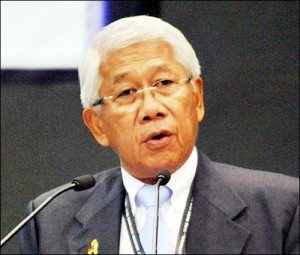Re-emergence of traditional security threats worries Defense chief
MANILA, Philippines – Territorial disputes, among other traditional security concerns, remain high as it re-emerges in the regional security agenda, Defense Secretary Voltaire Gazmin said.
Gazmin made the statement on Sunday during his speech at the 12th International Institute for Strategic Studies at the Shangri-la Dialogue held in Singapore.
The annual security forum was attended by defense ministers, military chiefs and top defense analysts from 27 countries.
“Traditional security concerns, including territorial disputes, issues surrounding the Korean Peninsula, military modernization and arms race, and proliferation of weapons, remain high in the regional security agenda,” Gazmin said, but did not make mention of China, which is locked in a territorial dispute with the Philippines over the hotly-contested West Philippine Sea.
The defense chief said that these sensitive issues “placed in the backburner” in the past have “re-emerged to take center stage,” and would be solved if states involved would settle these issues “through mechanisms provided by international law.”
“This dispels notions that these issues have become irrelevant in the 21st century with the emergence of non-traditional security challenges,” he said.
“Given this, while sensitive issues will not be resolved overnight, it would be timely for states to cooperate in finding means to achieve long-lasting regional stability through mechanisms provided by international law, with the hope of settling these issues with a sense of finality,” he added.
At the same time, Gazmin also recognized maritime security, disaster response, and cyber security as other security issues.
Gazmin recalled that maritime security, based on defense standpoint, used to be about protecting the Philippines’ territorial waters.
“However, illegal fishing, piracy, smuggling, and poaching, among others, make it necessary for our armed forces to work closely with maritime law enforcement agencies,” he said.
Cyber threats, meanwhile, are also becoming a security risk, as citizens become more dependent to technology.
“While cyber security previously focused only on individual hackers, recent trends show that attacks against government cyber portals could come from organizations. Thus, we need to develop our cyber-related capabilities as we secure our channels of communication,” he said.
Gazmin also noted the emergence of new security risks. “While these issues are not entirely new, they are increasingly becoming a concern for all government agencies, including the defense sector. First is food, water, and energy security. The scarcity of strategic resources, such as food and water, can eventually cause domestic instability as well as international conflict given the competition for limited resources,” he said.
The aging population is also fast becoming a security concern to the defense department according to Gazmin, even as he noted that the Philippines is one of the youngest population of Asia with a median of 23, but the population may increase to 142 million by 2040 according to the United Nations.
“On the part of the Department of National Defense, we need to provide pensions for our veterans and retirement benefits of our military personnel while ensuring that there are enough funds for our operations. Furthermore, an aging population would have implications on our ability to recruit new soldiers,” he said.
